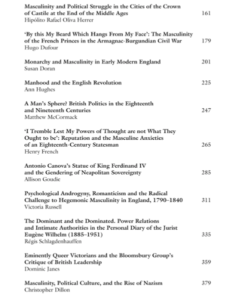The Franco-German lawyer Eugene Wilhelm (1866-1951), questions in his diary how he designs his masculinity and his sexual relations with men and women. Attracted by partners of low condition, he conceives his sexuality through a set of oppositions between public life and private life, professional life and personal life. The mutual dependency relationships between dominant and dominated men helps us to examine on the one hand the hierarchy of masculinities; on the other hand the nature of the process of domination in a group that shares the same sexual orientation. This unique evidence and its analysis constitutes a contribution to the research on
intimate authorities and also on the construction of a homosexual subculture between the late nineteen Century to the early twentieth
Century.
 Source : « The Dominant and the Dominated. Power Relations and Intimate Authorities in the Personal Diary of the Jurist Eugène Wilhelm (1885–1951)« , in The Palgrave Handbook of Masculinity and Political Culture in Europe, Fletcher, C., Brady, S., Moss, R.E., Riall, L. (Eds.), Palgrave MacMillan, 2018, p. 335-358.
Source : « The Dominant and the Dominated. Power Relations and Intimate Authorities in the Personal Diary of the Jurist Eugène Wilhelm (1885–1951)« , in The Palgrave Handbook of Masculinity and Political Culture in Europe, Fletcher, C., Brady, S., Moss, R.E., Riall, L. (Eds.), Palgrave MacMillan, 2018, p. 335-358.
About the Book : This handbook aims to challenge ‘gender blindness’ in the historical study of high politics, power, authority and government, by bringing together a group of scholars at the forefront of current historical research into the relationship between masculinity and political power. Until very recently in historical terms, formal political authority in Europe was normally and ideally held by adult males, with female power being perceived as a recurrent aberration. Yet paradoxically the study of the interactions between masculinity and political culture is still very much in its infancy. This volume seeks to remedy this lacuna by considering the different consequences of the masculinity of power over two millennia of European history. It examines how masculinity and political culture have interacted from ancient Rome and the early medieval Byzantine empire, to twentieth-century Germany and Italy. It considers a broad variety of case studies from early medieval Iceland and late medieval France, to Naples at the time of the French Revolution and Strasbourg after the Franco-Prussian War, with a particular focus on the development of political masculinities in Great Britain between the sixteenth century and the present day.








